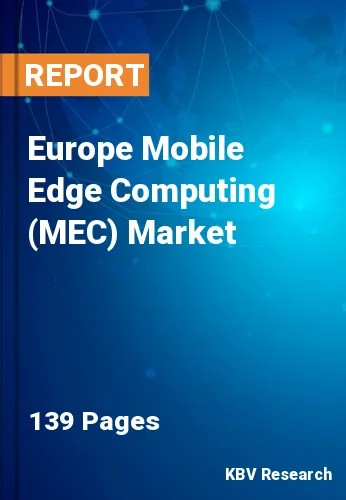Chapter 1. Market Scope & Methodology
1.1 Market Definition
1.2 Objectives
1.3 Market Scope
1.4 Segmentation
1.4.1 Europe Mobile Edge Computing (MEC) Market, by Enterprise Size
1.4.2 Europe Mobile Edge Computing (MEC) Market, by Component
1.4.3 Europe Mobile Edge Computing (MEC) Market, by Application
1.4.4 Europe Mobile Edge Computing (MEC) Market, by Country
1.5 Methodology for the research
Chapter 2. Market at a Glance
2.1 Key Highlights
Chapter 3. Market Overview
3.1 Introduction
3.1.1 Overview
3.1.1.1 Market Composition and Scenario
3.2 Key Factors Impacting the Market
3.2.1 Market Drivers
3.2.2 Market Restraints
3.2.3 Market Opportunities
3.2.4 Market Challenges
Chapter 4. Competition Analysis - Global
4.1 KBV Cardinal Matrix
4.2 Recent Industry Wide Strategic Developments
4.2.1 Partnerships, Collaborations and Agreements
4.2.2 Product Launches and Product Expansions
4.3 Market Share Analysis, 2023
4.4 Top Winning Strategies
4.4.1 Key Leading Strategies: Percentage Distribution (2020-2024)
4.4.2 Key Strategic Move: (Partnerships, Collaborations & Agreements: 2023, Jan – 2024, Sep) Leading Players
4.5 Porter Five Forces Analysis
Chapter 5. Europe Mobile Edge Computing (MEC) Market by Enterprise Size
5.1 Europe Large Enterprises Market by Country
5.2 Europe Small & Medium-sized Enterprises (SMEs) Market by Country
Chapter 6. Europe Mobile Edge Computing (MEC) Market by Component
6.1 Europe Hardware Market by Country
6.2 Europe Software Market by Country
6.3 Europe Services Market by Country
Chapter 7. Europe Mobile Edge Computing (MEC) Market by Application
7.1 Europe Location-Based Services Market by Country
7.2 Europe Video Surveillance Market by Country
7.3 Europe Unified Communication Market by Country
7.4 Europe Optimized Local Content Distribution Market by Country
7.5 Europe Data Analytics Market by Country
7.6 Europe Environmental Monitoring Market by Country
7.7 Europe Other Application Market by Country
Chapter 8. Europe Mobile Edge Computing (MEC) Market by Country
8.1 Germany Mobile Edge Computing (MEC) Market
8.1.1 Germany Mobile Edge Computing (MEC) Market by Enterprise Size
8.1.2 Germany Mobile Edge Computing (MEC) Market by Component
8.1.3 Germany Mobile Edge Computing (MEC) Market by Application
8.2 UK Mobile Edge Computing (MEC) Market
8.2.1 UK Mobile Edge Computing (MEC) Market by Enterprise Size
8.2.2 UK Mobile Edge Computing (MEC) Market by Component
8.2.3 UK Mobile Edge Computing (MEC) Market by Application
8.3 France Mobile Edge Computing (MEC) Market
8.3.1 France Mobile Edge Computing (MEC) Market by Enterprise Size
8.3.2 France Mobile Edge Computing (MEC) Market by Component
8.3.3 France Mobile Edge Computing (MEC) Market by Application
8.4 Russia Mobile Edge Computing (MEC) Market
8.4.1 Russia Mobile Edge Computing (MEC) Market by Enterprise Size
8.4.2 Russia Mobile Edge Computing (MEC) Market by Component
8.4.3 Russia Mobile Edge Computing (MEC) Market by Application
8.5 Spain Mobile Edge Computing (MEC) Market
8.5.1 Spain Mobile Edge Computing (MEC) Market by Enterprise Size
8.5.2 Spain Mobile Edge Computing (MEC) Market by Component
8.5.3 Spain Mobile Edge Computing (MEC) Market by Application
8.6 Italy Mobile Edge Computing (MEC) Market
8.6.1 Italy Mobile Edge Computing (MEC) Market by Enterprise Size
8.6.2 Italy Mobile Edge Computing (MEC) Market by Component
8.6.3 Italy Mobile Edge Computing (MEC) Market by Application
8.7 Rest of Europe Mobile Edge Computing (MEC) Market
8.7.1 Rest of Europe Mobile Edge Computing (MEC) Market by Enterprise Size
8.7.2 Rest of Europe Mobile Edge Computing (MEC) Market by Component
8.7.3 Rest of Europe Mobile Edge Computing (MEC) Market by Application
Chapter 9. Company Profiles
9.1 Nokia Corporation
9.1.1 Company Overview
9.1.2 Financial Analysis
9.1.3 Segmental and Regional Analysis
9.1.4 Research & Development Expense
9.1.5 Recent strategies and developments:
9.1.5.1 Partnerships, Collaborations, and Agreements:
9.1.6 SWOT Analysis
9.2 Huawei Technologies Co., Ltd. (Huawei Investment & Holding Co., Ltd.)
9.2.1 Company Overview
9.2.2 Financial Analysis
9.2.3 Segmental and Regional Analysis
9.2.4 Research & Development Expenses
9.2.5 Recent strategies and developments:
9.2.5.1 Product Launches and Product Expansions:
9.2.6 SWOT Analysis
9.3 Ericsson AB
9.3.1 Company Overview
9.3.2 Financial Analysis
9.3.3 Segmental and Regional Analysis
9.3.4 Research & Development Expense
9.3.5 Recent strategies and developments:
9.3.5.1 Partnerships, Collaborations, and Agreements:
9.3.5.2 Product Launches and Product Expansions:
9.3.6 SWOT Analysis
9.4 IBM Corporation
9.4.1 Company Overview
9.4.2 Financial Analysis
9.4.3 Regional & Segmental Analysis
9.4.4 Research & Development Expenses
9.4.5 SWOT Analysis
9.5 Microsoft Corporation
9.5.1 Company Overview
9.5.2 Financial Analysis
9.5.3 Segmental and Regional Analysis
9.5.4 Research & Development Expenses
9.5.5 Recent strategies and developments:
9.5.5.1 Partnerships, Collaborations, and Agreements:
9.5.6 SWOT Analysis
9.6 Cisco Systems, Inc.
9.6.1 Company Overview
9.6.2 Financial Analysis
9.6.3 Regional Analysis
9.6.4 Research & Development Expense
9.6.5 Recent strategies and developments:
9.6.5.1 Partnerships, Collaborations, and Agreements:
9.6.6 SWOT Analysis
9.7 Dell Technologies, Inc.
9.7.1 Company Overview
9.7.2 Financial Analysis
9.7.3 Segmental and Regional Analysis
9.7.4 Research & Development Expense
9.7.5 Recent strategies and developments:
9.7.5.1 Partnerships, Collaborations, and Agreements:
9.7.6 SWOT Analysis
9.8 Hewlett Packard Enterprise Company
9.8.1 Company Overview
9.8.2 Financial Analysis
9.8.3 Segmental and Regional Analysis
9.8.4 Research & Development Expense
9.8.5 SWOT Analysis
9.9 Amazon Web Services, Inc. (Amazon.com, Inc.)
9.9.1 Company Overview
9.9.2 Financial Analysis
9.9.3 Segmental Analysis
9.9.4 Recent strategies and developments:
9.9.4.1 Partnerships, Collaborations, and Agreements:
9.9.5 SWOT Analysis
9.10. Intel Corporation
9.10.1 Company Overview
9.10.2 Financial Analysis
9.10.3 Segmental and Regional Analysis
9.10.4 Research & Development Expenses
9.10.5 SWOT Analysis

